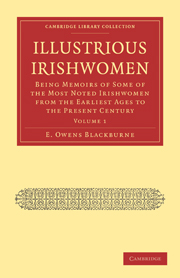 Illustrious Irishwomen
Illustrious Irishwomen DEARBHFORGUILL
Published online by Cambridge University Press: 07 September 2011
Summary
The Helen of Ireland
a.d. 1152
BEFORE recording the few meagre details to be gathered respecting Eva, the wife of Earl Strongbow, some brief memoir is necessary respecting the fair and frail Princess of Breffny.
In 1066, William the Norman had invaded and conquered England. More than one hundred years had passed away since that date, yet the Norman conquest of Ireland remained unattempted. Three kings of the race had ruled England, and as yet no Norman knight had set foot upon Irish soil.
At length they came, and the story of their coming begins with just such a domestic drama as Homer had turned into an epic two thousand years ago. Had Helen never been stolen, the Iliad would never have been written; and, in all probability, had not the Princess of Breffny fled from her lawful husband to her unlawful lover, Ireland would not so early have lost standing as an independent kingdom.
Dearbhforguill—or Dervorgil, as she is more commonly called—was the daughter of Mortough MacFloinn, King of Meath. She was early married to Tiegernach O'Rourke, Prince of Breffny; but the marriage, notwithstanding Thomas Moore's pathetic ballad anent the despair of the bereaved husband, does not seem ever to have been a happy one, or one in accordance with the wishes of the lady. With the exception of Roderick O'Connor, the Ard-righ, or chief king of Ireland, the most powerful monarch of the provincial kings was hoarse. He rather chose to be feared than to be loved.
- Type
- Chapter
- Information
- Illustrious IrishwomenBeing Memoirs of Some of the Most Noted Irishwomen from the Earliest Ages to the Present Century, pp. 44 - 49Publisher: Cambridge University PressPrint publication year: 2010First published in: 1877


